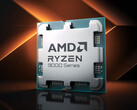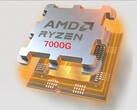Over the past few days, we've been hearing reports of AMD Ryzen 7000X3D processors suddenly burning out and damaging the board along with them. Well-known overclocker Der8auer (Roman Hartung) noticed such problems happening on a Ryzen 9 7900X non-X3D CPU as well. This has prompted board vendors to release BIOS updates workarounds to temporarily mitigate the problem.
The problem was initially thought to be related to EXPO profiles with the possible reason being enabling EXPO causes the SoC and VDDIO/MC voltages to spike to 1.36-1.4 V or even 1.5 V resulting in instant death of the CPU. Affected users noted their CPU swelling up at specific contact points leading to death of both the processor and the motherboard.
Using EXPO profiles technically constitutes overclocking, so users are left in a quandary when it comes to qualifying for an RMA under warranty. This is despite board vendors listing out specific RAM batches that are listed on the motherboard OEM's qualified vendor list (QVL).
According to Reddit user u/Speedrookie — who first shared a picture of an Asus X670 motherboard and a Ryzen 7 7800X3D with a bulging area — Asus support informed that because EXPO profiles were used, the CPU isn't covered by AMD's warranty.
Hardware Busters found the Ryzen 9 7950X3D and the Ryzen 7900X spiking to 130 W and 109 W at idle when tested on boards from Asus, MSI, and Gigabyte.
Motherboard vendors have been quick to release BIOS updates that lower the operating voltage and allow only undervolting. For instance, MSI issued BIOS updates for its AM5 boards that only support negative offset voltages while disabling all manual voltage and frequency adjustments.
AMD has been monitoring these reports and has now issued a clarification. The company is releasing a new AGESA version to board vendors that restricts the SoC voltage to 1.3 V to prevent the CPUs from operating beyond their specifications. In a statement to AnandTech, AMD said,
We have root caused the issue and have already distributed a new AGESA that puts measures in place on certain power rails on AM5 motherboards to prevent the CPU from operating beyond its specification limits, including a cap on SOC voltage at 1.3 V. None of these changes affect the ability of our Ryzen 7000 Series processors to overclock memory using EXPO or XMP kits or boost performance using PBO technology.
We expect all of our ODM partners to release new BIOS for their AM5 boards over the next few days. We recommend all users to check their motherboard manufacturers website and update their BIOS to ensure their system has the most up to date software for their processor.
Anyone whose CPU may have been impacted by this issue should contact AMD customer support. Our customer service team is aware of the situation and prioritizing these cases."
It is not exactly clear which power rails are being affected by this change. AMD says EXPO memory overclock and Precision Boost Overdrive (PBO) will not be affected, but enabling EXPO speeds indeed constitutes operating the CPU beyond its specifications.
It is also not fully clear as to how widespread the problem is and whether AMD and its partners intend to replace damaged CPUs and boards.
That being said, AMD specifies in its reviewer guides that DDR5-6000 is the sweet spot for Ryzen 7000 just like how DDR4-3600 was for the Ryzen 5000 series.
If you are running a Ryzen 7000 series processor, do keep an eye out for new BIOSes based on the updated AGESA firmware on your board vendor's official support site.




















